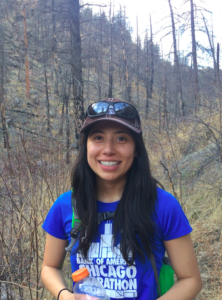Lilyana Ortega, originally from Chicago, was an assistant professor at the University of Maine at Farmington for two years before coming to the Department of Human Development and Family Studies at Colorado State University. Learn more about Ortega and her research in the area of prevention and intervention programs geared toward youth.
What brought you to CSU, and this department specifically?
I was really drawn in by the wonderful people in the HDFS department! The strong research focus is incredible, but there’s also a great focus on teaching and students. The department does a good job of balancing the two. Students can get involved in a variety of labs spanning across the developmental spectrum. There are many wonderful professors also focused on teaching and researching education. The department is great because each faculty member has different strengths, and they complement each other well. I was also excited about being able to teach courses in my area of expertise, including intervention and prevention science. I’m looking forward to bringing my research interests in restorative approaches with youth to the courses I teach.
What are your specific research interests, and how did you get into that topic?
My research broadly focuses on prevention and intervention programs geared towards youth. More specifically, I look at programs that use restorative justice approaches. Broadly, restorative approaches include alternatives to punitive measures, such as detentions or suspensions, in dealing with youth behavior referrals (particularly in school settings). However, these types of approaches can easily transfer to community- or system- level settings such as juvenile detention centers. Restorative approaches focus on a dialogue process to better understand the behavior that occurred and allow youth to take responsibility for their behaviors and be held accountable. These types of programs are becoming more common in school settings across all age groups.
I’ve evaluated and helped develop both community and school-based restorative programs for high-risk youth, and really enjoy better understanding the components necessary to make these programs more successful. I got into this type of research during grad school when I was given the opportunity to provide restorative skills training to youth at a juvenile detention center. I had never heard of restorative justice before, so getting to jump in and learn the theory while teaching youth skills was a great opportunity.
What’s your teaching philosophy?
If I had to sum up my teaching philosophy in a few words I would say it’s very student-centered. Using experiential learning and active student involvement is so critical for deeper understanding of the material to occur. I like to pull student experiences into the classroom and see how their experiences influence their thoughts around the topics we discuss. Through dialogue and the exploration of different perspectives, I like to challenge my students to be critical thinkers. I believe that if I can make the content relevant to their lives, then students will be more invested and will retain more of the information.
I like to keep things interesting by using a combination of lectures, videos, podcasts, Ted Talks, and having guest speakers. Students often respond really well to the podcasts and Ted Talks because they are used to watching or listening to these in their daily lives.
What classes will you be teaching this coming semester?
HDFS 101: Individual and Family Development: This course discusses development from prenatal through death. One cool activity that students will get to experience in this course is raising a virtual child. As we talk about development across the lifespan, students can see how this plays out in their own virtual child. Students answer a handful of questions with each developmental stage, and then they get to see how those decisions impacted their developing virtual child. It’s neat to see students engaging in course discussions about how their virtual child is developing and what types of challenges they are facing as virtual parents. This really helps make the content more relevant for those students who do not have much experience with children.
HDFS 375: Lifespan intervention and prevention science: This course focuses on how to improve health, mental health and well-being of individuals and families across the lifespan. Students get a chance to learn about evidence based intervention and prevention programs and how to evaluate programs. This course is especially relevant to students that want to be in the human service fields.
HDFS 492: Seminar Program proposal development: In this capstone course students are guided through the grant writing process as they pick an organization to work with and then work on a grant to meet one of the needs of that organization. This is a fun class because many students have already worked with organizations through their internships or other fieldwork, and now they are able to connect back with those organizations to meet the course requirements.
What’s your favorite thing about campus?
I’m still discovering a lot about the campus, but so far, the campus layout and size seem very familiar to me. I went to Big Ten schools so it feels like “home.” In the HDFS department, I really like the community feel; even though it’s a bigger campus there are little pockets that feel closer knit. I also love all the green spaces and trees; I especially enjoy walking around the Oval! I’m amazed by all the wonderful lectures, events, and opportunities to get involved. It seems like a very friendly and caring community.
The Department of Human Development and Family Studies is part of CSU’s College of Health and Human Sciences.